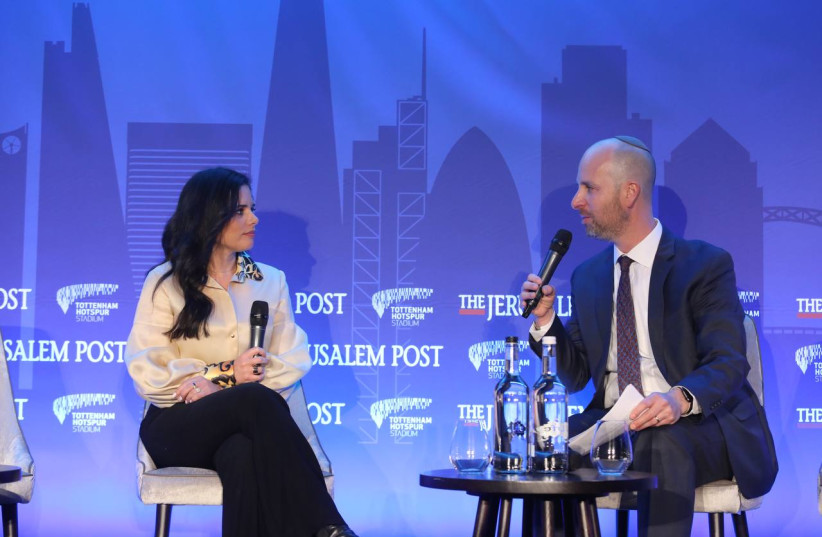Israeli and British ties have reached a new level of intimacy. That is the message that came out from all of the different officials who participated last week at The Jerusalem Post conference in London. The conference opened with a reception at the House of Lords hosted by Lord Jon Mendelsohn of the Labour Party and Lord Stuart Polak of the Conservative Party.
Lord Ian Austin, Prime Minister Boris Johnson’s official trade envoy to the State of Israel, spoke at the event and explained how trade has been on an upward trajectory in recent years and how the United Kingdom is Israel’s third largest trade partner.
At the day-long conference at the Tottenham Hotspur stadium the following day, Lord David Wolfson, the undersecretary of state for justice, spoke out against the double standard that is sometimes applied to Israel as illustrated by Amnesty International’s recent report about Israel in which it accused the Jewish state of apartheid.
“Antisemitism is hate speech, and all democracies have drawn a line between free speech and hate speech,” Wolfson said. “There are things you cannot say because they are defamatory, and there are things you cannot say because they are racist.
Interior Minister Ayelet Shaked was in London and following her participation in the conference met with Home Secretary Priti Patel who was one of the engines behind a recent decision by the UK to declare all of Hamas a terrorist organization and not just its military wing.

Lord John Mann, the UK’s special envoy to combat antisemitism, revealed that Britain was on its way to rolling out a plan to combat antisemitism on university campuses across the country with the establishment of a new taskforce that he would head.
“This is the golden era of relations between the countries,” one Israeli diplomat said. “This is the true message.”
And it is felt. It is felt by trade, it is felt by scientific cooperation, the collaborations in the battle during the coronavirus pandemic and it is also felt on the security and defense front.
The IDF and the British military signed a military cooperation agreement in 2020 and a few months ago, fighter jets from the Royal Air Force deployed in Israel to participate in the international Blue Flag exercise. It was the first time RAF jets had deployed in Israel since the British Mandate ended in 1948.
British Ambassador to Israel Neil Wigan said at the conference that the UK is looking to further advance its cooperation with Israel on security.
“I think it is a fit,” he said during a panel discussion with deputy Israeli ambassador to the UK Oren Marmorstein. “Israeli use of technology and how to do security and military operations, we are very interested in this. Our armed forces has a big appetite to learn and profit from that.”
Wigan said England “wants to make stuff [even] more concrete… really enduring” in security cooperation and other areas
As Wigan pointed out, when Prime Minister Johnson spoke in Parliament recently about the British aim to establish more “unicorns” - tech companies valued at $1 billion - he mentioned two other countries that the UK should emulate: the US and Israel.
While the ties are close, this doesn’t mean that everything is perfect and that Jerusalem and London agree on every issue.
Britain, for example, is a supporter of the International Criminal Court and while it has publicly opposed the investigation launched against Israel it has retained its support of the court.
There are also the continued negotiations with Iran in Vienna. While Britain has taken a tough stance against allowing Iran nuclear power, it has not come out against the American intention to remove the Islamic Revolutionary Guard Corps from the United States’s foreign terrorist list, a move that Israeli officials have called absurd and dangerous.
Despite the disagreements, there is a level of friendship today between Jerusalem and London not previously felt. And this is to the credit of both governments for understanding that while they might have disagreements on some issues, it does not have to undermine the quality of the relations.
The Jerusalem Post conference in London last week was another illustration of those close ties. We were proud to play a role.
